Campus/People
-
 KAIST Unveils Vision 2031, a Blueprint for KAIST's Future
(Participants at the Vision 2031 Declaration Ceremony pose after the ceremony on March 20.)
KAIST presented a blueprint for KAIST’s future, “Vision 2031” looking toward its 60th anniversary. The strategic development plan for a “Global Value-Creative Leading University” aims at being one of the top universities in the world by the year 2031.
Unveiling its 2031 Vision, KAIST President Sung-Chul Shin presented the three-stage, five-year action plan during a ceremony held on March 20.
He stressed that innovation in the five pillars of education, research, technology commercialization, globalization, and future strategy will further advance the excellence of KAIST, to help it become a trailblazer in Korea and beyond.
President Shin said that Vision 2031 holds a special meaning, as the full support of the KAIST community was garnered to complete this shared vision for KAIST.
Approximately 140 members of the Vision Committee participated in the brainstorming process over the past ten months for reaching this vision. The committee went through consensus building procedures of public hearings engaging all of the stakeholders on campus as well as outside experts. The committee published “Vision 2031: KAIST’s Future Report” this month, detailing the action plan of innovation strategies for reaching its new vision as well as an expanded budget funding plan to secure 2 trillion KRW by 2031, up from the current 860 billion KRW.
First, in education, KAIST will foster creative leaders who will translate the knowledge created by science and technology into social values. In research, KAIST will conduct research projects to address both national and global challenges. KAIST will pursue becoming an entrepreneurial university that will enrich its technological value. In globalization innovation, KAIST will move forward to serve as a world bridge. Lastly, KAIST will steer toward the ‘What’ (problem definition) over the ‘How’ (problem solving) for addressing challenges in pursuing future strategy innovation.
The ceremony was held in Chung Kunmo Hall, in the newly opened the Academic Cultural Complex, with an attendance of more than 300 distinguished guests including global leaders in higher education, government, and industry, as well as from KAIST community.
Noted participants from abroad included KAIST President’s Advisory Council members such as Former President of ETH Zurich Rlaph Eichler, President of HKUST Tony Chan, President-elect Kazuya Masu of the Tokyo Institute of Technology, Former President of the National University of Singapore Tan Chorh Chuan, Nobel laureate Professor Kurt Wuthrich of the Scripps Research Institute, and Professor Klaus von Klitzing from the Max Planck Institute for Solid State Research. Former KAIST Presidents including Dr. Nam-Pyo Suh, Chairman of JoongAng Holdings Seok-hyun Hong, Elsevier Chairman Youngsuk Chi, KISWE Mobile Executive Chairman Jeong H. Kim also attended the ceremony.
In honor of the Vision 2031 declaration, KAIST is hosting 25 events during Vision Week from March 19 to 23 across the campus including academic forums, distinguished lectures, exhibits, and a coding challenge, among others. The opening of the Academic Cultural Center, an iconic building accommodating the new library, Cultural Building, and Vision Hall, launched Vision Week on Monday, March 19.
KAIST also dedicated Chung Kunmo Hall in the Academic Cultural Complex, a 300-seat capacity multi-purpose hall in honor of Professor Keun-Mo Chung, who played an instrumental role in founding KAIST in 1971.
Professor Chung submitted the proposal to US Aid to establish KAIST in 1969. US Aid asked the vice-president of Stanford University at the time, Frederick Terman, to conduct a feasibility study on the establishment of KAIST. The Terman Report, approving the founding of KAIST, was published in 1970 and KAIST was founded the next year. Following the dedication of Terman Hall in 2004, KAIST has now inducted its two founding figures.
“We had the guidebook of the Terman Report back then. We faithfully accomplished the initial mission and goals the Terman Report contained. At this critical juncture of the new global environment, we need to establish a new vision to continue to develop. As much as the Terman Report drove us to our current success, I hope the Vision 2031 KAIST Future Report will advance KAIST to its new chapter,” President Shin said.
Stressing that the ideal KAISTian is defined by the 3C spirit: Challenge, Creativity, and Caring, President Shin said, “Members of KAIST are expected to embrace challenges, generate creative ideas, and care for others. By recommitting to the five innovation strategies equipped with the KAIST spirit, KAIST will emerge as one of the top universities of science and technology by the year 2031 and contribute to the happiness and prosperity of humankind. I hope KAIST will be a great source of pride for Koreans and lay the foundation for Korea to take the lead in the age of the Fourth Industrial Revolution.”
2018.03.20 View 8164
KAIST Unveils Vision 2031, a Blueprint for KAIST's Future
(Participants at the Vision 2031 Declaration Ceremony pose after the ceremony on March 20.)
KAIST presented a blueprint for KAIST’s future, “Vision 2031” looking toward its 60th anniversary. The strategic development plan for a “Global Value-Creative Leading University” aims at being one of the top universities in the world by the year 2031.
Unveiling its 2031 Vision, KAIST President Sung-Chul Shin presented the three-stage, five-year action plan during a ceremony held on March 20.
He stressed that innovation in the five pillars of education, research, technology commercialization, globalization, and future strategy will further advance the excellence of KAIST, to help it become a trailblazer in Korea and beyond.
President Shin said that Vision 2031 holds a special meaning, as the full support of the KAIST community was garnered to complete this shared vision for KAIST.
Approximately 140 members of the Vision Committee participated in the brainstorming process over the past ten months for reaching this vision. The committee went through consensus building procedures of public hearings engaging all of the stakeholders on campus as well as outside experts. The committee published “Vision 2031: KAIST’s Future Report” this month, detailing the action plan of innovation strategies for reaching its new vision as well as an expanded budget funding plan to secure 2 trillion KRW by 2031, up from the current 860 billion KRW.
First, in education, KAIST will foster creative leaders who will translate the knowledge created by science and technology into social values. In research, KAIST will conduct research projects to address both national and global challenges. KAIST will pursue becoming an entrepreneurial university that will enrich its technological value. In globalization innovation, KAIST will move forward to serve as a world bridge. Lastly, KAIST will steer toward the ‘What’ (problem definition) over the ‘How’ (problem solving) for addressing challenges in pursuing future strategy innovation.
The ceremony was held in Chung Kunmo Hall, in the newly opened the Academic Cultural Complex, with an attendance of more than 300 distinguished guests including global leaders in higher education, government, and industry, as well as from KAIST community.
Noted participants from abroad included KAIST President’s Advisory Council members such as Former President of ETH Zurich Rlaph Eichler, President of HKUST Tony Chan, President-elect Kazuya Masu of the Tokyo Institute of Technology, Former President of the National University of Singapore Tan Chorh Chuan, Nobel laureate Professor Kurt Wuthrich of the Scripps Research Institute, and Professor Klaus von Klitzing from the Max Planck Institute for Solid State Research. Former KAIST Presidents including Dr. Nam-Pyo Suh, Chairman of JoongAng Holdings Seok-hyun Hong, Elsevier Chairman Youngsuk Chi, KISWE Mobile Executive Chairman Jeong H. Kim also attended the ceremony.
In honor of the Vision 2031 declaration, KAIST is hosting 25 events during Vision Week from March 19 to 23 across the campus including academic forums, distinguished lectures, exhibits, and a coding challenge, among others. The opening of the Academic Cultural Center, an iconic building accommodating the new library, Cultural Building, and Vision Hall, launched Vision Week on Monday, March 19.
KAIST also dedicated Chung Kunmo Hall in the Academic Cultural Complex, a 300-seat capacity multi-purpose hall in honor of Professor Keun-Mo Chung, who played an instrumental role in founding KAIST in 1971.
Professor Chung submitted the proposal to US Aid to establish KAIST in 1969. US Aid asked the vice-president of Stanford University at the time, Frederick Terman, to conduct a feasibility study on the establishment of KAIST. The Terman Report, approving the founding of KAIST, was published in 1970 and KAIST was founded the next year. Following the dedication of Terman Hall in 2004, KAIST has now inducted its two founding figures.
“We had the guidebook of the Terman Report back then. We faithfully accomplished the initial mission and goals the Terman Report contained. At this critical juncture of the new global environment, we need to establish a new vision to continue to develop. As much as the Terman Report drove us to our current success, I hope the Vision 2031 KAIST Future Report will advance KAIST to its new chapter,” President Shin said.
Stressing that the ideal KAISTian is defined by the 3C spirit: Challenge, Creativity, and Caring, President Shin said, “Members of KAIST are expected to embrace challenges, generate creative ideas, and care for others. By recommitting to the five innovation strategies equipped with the KAIST spirit, KAIST will emerge as one of the top universities of science and technology by the year 2031 and contribute to the happiness and prosperity of humankind. I hope KAIST will be a great source of pride for Koreans and lay the foundation for Korea to take the lead in the age of the Fourth Industrial Revolution.”
2018.03.20 View 8164 -
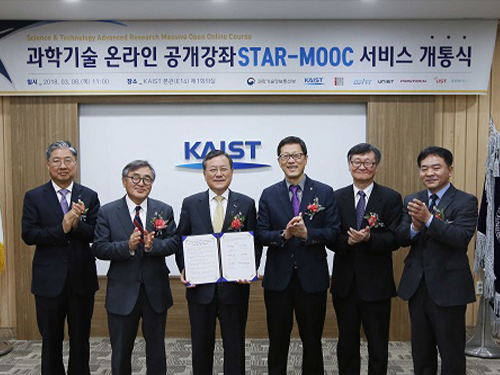 Open Online Course in Science and Technology, STAR-MOOC
Four universities specializing in science and technology, along with POSTECH and UST, teamed up to establish programs for innovation in education programs, responding to the Fourth Industrial Revolution.
KAIST held an opening ceremony for the Science & Technology Advanced Research - Massive Open Online Course (STAR-MOOC) and signed an MoU with GIST, DGIST, UNIST, POSTECH, and UST.
STAR-MOOC was launched on February 26 to provide educational service to the public. It is a joint platform where people can take courses featuring lectures from professors from universities specializing in science and technology as well as national research universities.
It offers 15 courses covering basics, majors, and electives related to science and technology developed by the STAR-MOOC committee. Students can take a variety of courses.
At the opening ceremony, KAIST President Sung-Chul Shin, DGIST President Sang Hyuk Son, UST President Kil Choo Moon, POSTECH Vice President Wankyun Chung, UNIST Vice President Jae Sung Lee, GIST Vice President of Public Affairs Pil-hwan Park came to sign the MoU for provising educational services for the public.
During the ceremony, there was also time to introduce a technical agreement with a non-profit organization founded by NAVER, the CONNECT Foundation, for its courses and platform.
Universities participating in STAR-MOOC will put effort into capacity building in response to changes driven by the Fourth Industrial Revolution.
President Shin said, “STAR-MOOC is a platform that provides science and technology courses from basics to electives and major courses. It will become a leading educational platform.”
Students can register and choose courses from the website (http://starmooc.kr).
2018.03.19 View 10081
Open Online Course in Science and Technology, STAR-MOOC
Four universities specializing in science and technology, along with POSTECH and UST, teamed up to establish programs for innovation in education programs, responding to the Fourth Industrial Revolution.
KAIST held an opening ceremony for the Science & Technology Advanced Research - Massive Open Online Course (STAR-MOOC) and signed an MoU with GIST, DGIST, UNIST, POSTECH, and UST.
STAR-MOOC was launched on February 26 to provide educational service to the public. It is a joint platform where people can take courses featuring lectures from professors from universities specializing in science and technology as well as national research universities.
It offers 15 courses covering basics, majors, and electives related to science and technology developed by the STAR-MOOC committee. Students can take a variety of courses.
At the opening ceremony, KAIST President Sung-Chul Shin, DGIST President Sang Hyuk Son, UST President Kil Choo Moon, POSTECH Vice President Wankyun Chung, UNIST Vice President Jae Sung Lee, GIST Vice President of Public Affairs Pil-hwan Park came to sign the MoU for provising educational services for the public.
During the ceremony, there was also time to introduce a technical agreement with a non-profit organization founded by NAVER, the CONNECT Foundation, for its courses and platform.
Universities participating in STAR-MOOC will put effort into capacity building in response to changes driven by the Fourth Industrial Revolution.
President Shin said, “STAR-MOOC is a platform that provides science and technology courses from basics to electives and major courses. It will become a leading educational platform.”
Students can register and choose courses from the website (http://starmooc.kr).
2018.03.19 View 10081 -
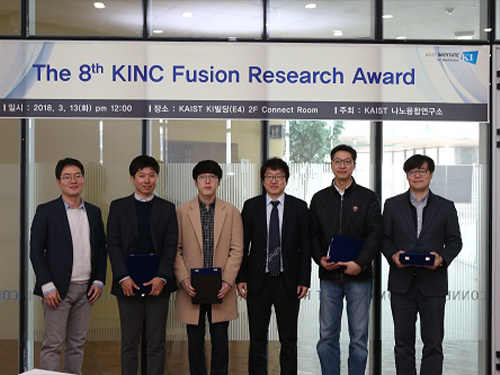 The 8th KINC Fusion Research Awardees
The KAIST Institute for NanoCentury held the 8th KINC Fusion Research Award in order to encourage professors’ convergence studies and instill students’ willingness to research. The award ceremony took place in the KI Building at KAIST on March 13.
The KINC Fusion Research Award selects the most outstanding convergence studies among research undertaken last year, and awards researchers who participated in that research.
The 8th KINC Fusion Research Award went to Professor Yoon Sung Nam from the Department of Materials Science and Engineering and Professor Inkyu Park from the Department of Mechanical Engineering. Their research reported the spontaneous self-biomineralization of palladium (Pd) ions on a filamentous virus to form ligand-free Pd nanowires without reducing reagents or using additional surface stabilizers (Title: Virus-Templated Self-Mineralization of Ligand-Free Colloidal Palladium Nanostructures for High Surface Activity and Stability, Advanced Functional Materials (2017)).
Professor Hee-Tae Jung, the Director of KAIST Institute for the NanoCentury and the host of the KINC Fusion Research Award said, “Convergence will be the crucial keyword that will lead to revolutionary change. Hence, the importance of convergence study should be improved. We will put every effort into creating a research environment for increasing convergence study.
The KAIST Institute for the NanoCentury was established in June 2006 under the KAIST Institute with a mission of creating convergence study by tearing down boarders among departments and carrying out interdisciplinary joint research. Currently, approximately 90 professors from 14 departments participate the institute. It aims to become a hub of university institutes for nano-fusion research.
2018.03.19 View 15186
The 8th KINC Fusion Research Awardees
The KAIST Institute for NanoCentury held the 8th KINC Fusion Research Award in order to encourage professors’ convergence studies and instill students’ willingness to research. The award ceremony took place in the KI Building at KAIST on March 13.
The KINC Fusion Research Award selects the most outstanding convergence studies among research undertaken last year, and awards researchers who participated in that research.
The 8th KINC Fusion Research Award went to Professor Yoon Sung Nam from the Department of Materials Science and Engineering and Professor Inkyu Park from the Department of Mechanical Engineering. Their research reported the spontaneous self-biomineralization of palladium (Pd) ions on a filamentous virus to form ligand-free Pd nanowires without reducing reagents or using additional surface stabilizers (Title: Virus-Templated Self-Mineralization of Ligand-Free Colloidal Palladium Nanostructures for High Surface Activity and Stability, Advanced Functional Materials (2017)).
Professor Hee-Tae Jung, the Director of KAIST Institute for the NanoCentury and the host of the KINC Fusion Research Award said, “Convergence will be the crucial keyword that will lead to revolutionary change. Hence, the importance of convergence study should be improved. We will put every effort into creating a research environment for increasing convergence study.
The KAIST Institute for the NanoCentury was established in June 2006 under the KAIST Institute with a mission of creating convergence study by tearing down boarders among departments and carrying out interdisciplinary joint research. Currently, approximately 90 professors from 14 departments participate the institute. It aims to become a hub of university institutes for nano-fusion research.
2018.03.19 View 15186 -
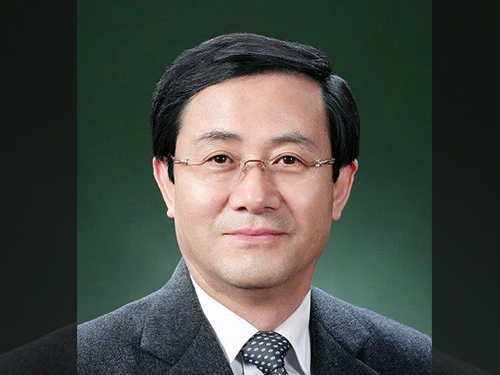 Professor Emeritus Jung Ki Park Won the IBA Technology Award 2018
(Professor Emeritus Jung Ki Park)
Professor Emeritus Jung Ki Park from the Department of Chemical and Biomolecular Engineering received the IBA Technology Award from the International Battery Association (IBA).
IBA 2018 was held from March 11 to 16 on Jeju Island, which was the first time it was hosted in Korea. The conference was an excellent opportunity to let the world know the level of the Korean rechargeable battery industry and its technology.
Professor Park delivered his keynote speech titled Advances in Lithium Batteries in Korea at the conference and received the IBA Technology Award as the first Korean recipient.
Professor Park is a world-renowned scholar who was a groundbreaker in the rechargeable battery industry. He was recognized by the IBA Award Committee for his contributions carrying out research and development, fostering competent people, and enhancing the lithium rechargeable battery industry in Korea over the last 30 years.
Professor Park said, “It is my great honor to receive this award, which is the best international award in the field of rechargeable batteries. I would like to share this with my colleagues and students. As competition in the rechargeable industry intensifies, systemic cooperation among industries, academia, and government is needed for the continued development of the battery industry in Korea.
2018.03.19 View 9087
Professor Emeritus Jung Ki Park Won the IBA Technology Award 2018
(Professor Emeritus Jung Ki Park)
Professor Emeritus Jung Ki Park from the Department of Chemical and Biomolecular Engineering received the IBA Technology Award from the International Battery Association (IBA).
IBA 2018 was held from March 11 to 16 on Jeju Island, which was the first time it was hosted in Korea. The conference was an excellent opportunity to let the world know the level of the Korean rechargeable battery industry and its technology.
Professor Park delivered his keynote speech titled Advances in Lithium Batteries in Korea at the conference and received the IBA Technology Award as the first Korean recipient.
Professor Park is a world-renowned scholar who was a groundbreaker in the rechargeable battery industry. He was recognized by the IBA Award Committee for his contributions carrying out research and development, fostering competent people, and enhancing the lithium rechargeable battery industry in Korea over the last 30 years.
Professor Park said, “It is my great honor to receive this award, which is the best international award in the field of rechargeable batteries. I would like to share this with my colleagues and students. As competition in the rechargeable industry intensifies, systemic cooperation among industries, academia, and government is needed for the continued development of the battery industry in Korea.
2018.03.19 View 9087 -
 Scientist of March, Professor Hee-Seung Lee
(Professor Hee-Seung Lee)
Professor Hee-Seung Lee from the Department of Chemistry at KAIST received the ‘Science and Technology Award of the Month’ awarded by the Ministry of ICT and Science, and the National Research Foundation of Korea for March 2018.
Professor Lee has been recognized for successfully producing peptide-based molecular machines, which used to be made of metals.
The methodology can be translated into magnetotactic behavior at the macroscopic scale, which is reminiscent of magnetosomes in magnetotactic bacteria.
The team employed foldectures, self-assembled molecular architectures of β-peptide foldamers, to develop the peptide-based molecular machines that uniformly align with respect to an applied static magnetic field.
Professor Lee said, “Molecular machines are widely used in the field of medical engineering or material science; however, there were limitations for developing the machines using magnetic fields. By developing peptide-based molecular machines, we were able to develop body-friendly molecular machines.”
Every month, the Ministry of ICT and Science and the National Research Foundation of Korea award a cash prize worth 10,000,000 KRW to a scientist who has contributed to science and technology with outstanding research and development performance.
2018.03.15 View 11414
Scientist of March, Professor Hee-Seung Lee
(Professor Hee-Seung Lee)
Professor Hee-Seung Lee from the Department of Chemistry at KAIST received the ‘Science and Technology Award of the Month’ awarded by the Ministry of ICT and Science, and the National Research Foundation of Korea for March 2018.
Professor Lee has been recognized for successfully producing peptide-based molecular machines, which used to be made of metals.
The methodology can be translated into magnetotactic behavior at the macroscopic scale, which is reminiscent of magnetosomes in magnetotactic bacteria.
The team employed foldectures, self-assembled molecular architectures of β-peptide foldamers, to develop the peptide-based molecular machines that uniformly align with respect to an applied static magnetic field.
Professor Lee said, “Molecular machines are widely used in the field of medical engineering or material science; however, there were limitations for developing the machines using magnetic fields. By developing peptide-based molecular machines, we were able to develop body-friendly molecular machines.”
Every month, the Ministry of ICT and Science and the National Research Foundation of Korea award a cash prize worth 10,000,000 KRW to a scientist who has contributed to science and technology with outstanding research and development performance.
2018.03.15 View 11414 -
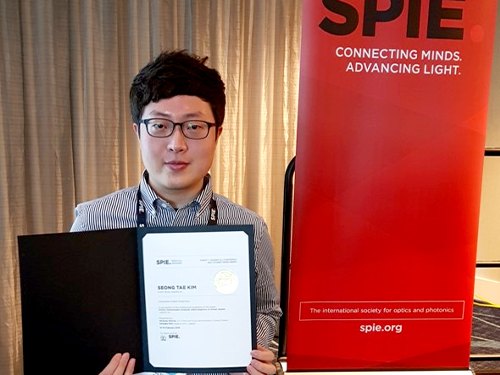 Seong-Tae Kim Wins Robert-Wagner All-Conference Best Paper Award
(Ph.D. candidate Seong-Tae Kim)
Ph.D. candidate Seong-Tae Kim from the School of Electrical Engineering won the Robert Wagner All-Conference Best Student Paper Award during the 2018 International Society for Optics and Photonics (SPIE) Medical Imaging Conference, which was held in Houston last month.
Kim, supervised by Professor Yong Man Ro, received the award for his paper in the category of computer-aided diagnosis. His paper, titled “ICADx: Interpretable Computer-Aided Diagnosis of Breast Masses”, was selected as the best paper out of 900 submissions. The conference selects the best paper in nine different categories. His research provides new insights on diagnostic technology to detect breast cancer powered by deep learning.
2018.03.15 View 13009
Seong-Tae Kim Wins Robert-Wagner All-Conference Best Paper Award
(Ph.D. candidate Seong-Tae Kim)
Ph.D. candidate Seong-Tae Kim from the School of Electrical Engineering won the Robert Wagner All-Conference Best Student Paper Award during the 2018 International Society for Optics and Photonics (SPIE) Medical Imaging Conference, which was held in Houston last month.
Kim, supervised by Professor Yong Man Ro, received the award for his paper in the category of computer-aided diagnosis. His paper, titled “ICADx: Interpretable Computer-Aided Diagnosis of Breast Masses”, was selected as the best paper out of 900 submissions. The conference selects the best paper in nine different categories. His research provides new insights on diagnostic technology to detect breast cancer powered by deep learning.
2018.03.15 View 13009 -
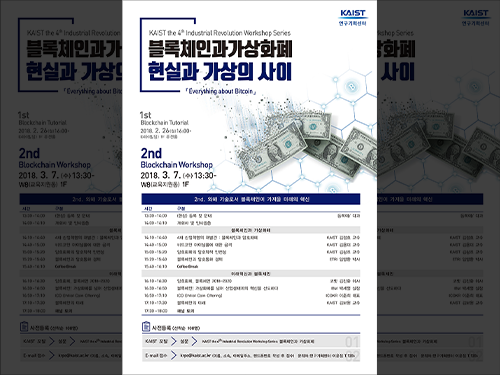 Blockchain and Cryptocurrency: Between Reality and Virtuality
A workshop on blockchain and cryptocurrency, one of the 4th Industrial Revolution Workshop Series, was held at the KAIST main campus on March 7.
Experts from industry, academia, and research gathered and shared their opinions about blockchain technology, which is currently gaining huge attention along with cryptocurrency.
During the workshop, four KAIST professors and four experts from institutes and business examined the scope on the possibility of blockchain, technology for the Fourth Industrial Revolution.
Moreover, they discussed a variety of issues including mining, wallets, cryptocurrency, information security, smart contracts, and ICOs.
In a previous blockchain tutorial, Professor Yongdae Kim from the School of Electrical Engineering at KAIST and Professor Hyoungshick Kim from Sungkyunkwan University opened up a blockchain tutorial which provided a technical understanding of blockchain, such as the birth of cryptocurrency, algorithm design, and exchange methods.
Professor Jungho Kim, who is in charge of this event, said, “This workshop will broaden the understanding of blockchain, which can provide a foundation for a national growth engine.”
2018.03.07 View 9203
Blockchain and Cryptocurrency: Between Reality and Virtuality
A workshop on blockchain and cryptocurrency, one of the 4th Industrial Revolution Workshop Series, was held at the KAIST main campus on March 7.
Experts from industry, academia, and research gathered and shared their opinions about blockchain technology, which is currently gaining huge attention along with cryptocurrency.
During the workshop, four KAIST professors and four experts from institutes and business examined the scope on the possibility of blockchain, technology for the Fourth Industrial Revolution.
Moreover, they discussed a variety of issues including mining, wallets, cryptocurrency, information security, smart contracts, and ICOs.
In a previous blockchain tutorial, Professor Yongdae Kim from the School of Electrical Engineering at KAIST and Professor Hyoungshick Kim from Sungkyunkwan University opened up a blockchain tutorial which provided a technical understanding of blockchain, such as the birth of cryptocurrency, algorithm design, and exchange methods.
Professor Jungho Kim, who is in charge of this event, said, “This workshop will broaden the understanding of blockchain, which can provide a foundation for a national growth engine.”
2018.03.07 View 9203 -
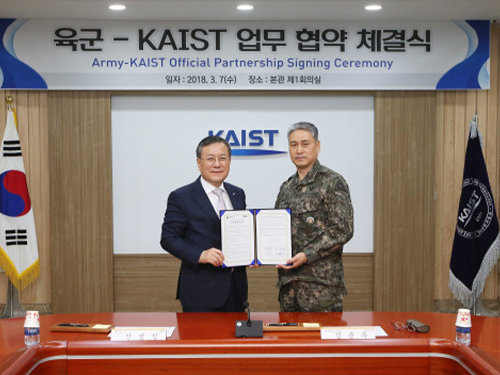 MoU Signed by the Republic of Korea Army and KAIST
(From left: KAIST President Sung-Chul Shin and ROKA Chief of Staff Youngwoo Kim)
On March 7, the Republic of Korea Army (ROKA) and KAIST signed an MoU and opened special sessions dedicated to the army in order to reinforce research and development capacities.
The close partnership between KAIST and ROKA will provide an opportunity to establish advanced combat development systems.
Through the MoU, signed by KAIST President Sung-Chul Shin and ROKA Chief of Staff Youngwoo Kim, both organizations will discuss new opportunities for cooperation between academia and military and establish an institute and its curriculum.
KAIST is offering special sessions for the army March 5-9, where about 150 executives from ROKA, including the headquarters, education and training command, and logistics command, will participate.
These session are expected to enhance the army’s capabilities through education on cutting-edge equipment that will emerge during the Fourth Industrial Revolution.
The director of the KAIST Security Convergence Institute, Soo Hyun Kim, said, “KAIST and ROKA will plan and operate various programs together though this partnership as well as special sessions. I hope this cooperation will be an opportunity to enhance the combat development of ROKA.”
2018.03.07 View 7555
MoU Signed by the Republic of Korea Army and KAIST
(From left: KAIST President Sung-Chul Shin and ROKA Chief of Staff Youngwoo Kim)
On March 7, the Republic of Korea Army (ROKA) and KAIST signed an MoU and opened special sessions dedicated to the army in order to reinforce research and development capacities.
The close partnership between KAIST and ROKA will provide an opportunity to establish advanced combat development systems.
Through the MoU, signed by KAIST President Sung-Chul Shin and ROKA Chief of Staff Youngwoo Kim, both organizations will discuss new opportunities for cooperation between academia and military and establish an institute and its curriculum.
KAIST is offering special sessions for the army March 5-9, where about 150 executives from ROKA, including the headquarters, education and training command, and logistics command, will participate.
These session are expected to enhance the army’s capabilities through education on cutting-edge equipment that will emerge during the Fourth Industrial Revolution.
The director of the KAIST Security Convergence Institute, Soo Hyun Kim, said, “KAIST and ROKA will plan and operate various programs together though this partnership as well as special sessions. I hope this cooperation will be an opportunity to enhance the combat development of ROKA.”
2018.03.07 View 7555 -
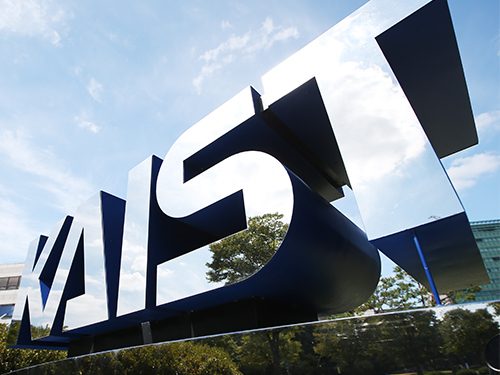 The 22nd Humanistic Education Opens to Daejeon Citizens
The KAIST Research Center for Humanities and Social Sciences will open up the 22nd Humanistic Education for Citizens every week from March 21 to April 25.
People can apply for this program through its website (http://hss.kaist.ac.kr), starting from March 12. Anyone living in Daejeon can participate in this program at no charge but the program is limited to 100 participants on a first-come, first-serve basis.
KAIST Humanistic Education for Citizens was established in 2012 and is held four times during a year to reinforce bonding with local citizens and enhance cultural refinement and an appreciation of literature.
With the topic ‘Are News Facts?” the seminar has invited six lecturers, including Researcher Soo Young Kim from the Institute of Communication Research, to navigate various issues that smart news users need to know in this era of massive news consumption.
The lecture is dedicated to discussing a current hot issue, the phenomenon of fake news, from various perspectives and to promote smart news consumption.
It will also help to provide an understanding of legal and policy changes regarding media production and distribution.
Professor Donghwan Ko, who is also the dean of the School of Humanities and Social Sciences said, “The lectures will provide information on various issues that people need to know more about for smart news consumption in the “infoglut” era from media, psychological, social, and legal perspectives.”
The lectures will be held every Wednesday at 3pm in the School of Humanities and Social Sciences.
2018.03.06 View 6849
The 22nd Humanistic Education Opens to Daejeon Citizens
The KAIST Research Center for Humanities and Social Sciences will open up the 22nd Humanistic Education for Citizens every week from March 21 to April 25.
People can apply for this program through its website (http://hss.kaist.ac.kr), starting from March 12. Anyone living in Daejeon can participate in this program at no charge but the program is limited to 100 participants on a first-come, first-serve basis.
KAIST Humanistic Education for Citizens was established in 2012 and is held four times during a year to reinforce bonding with local citizens and enhance cultural refinement and an appreciation of literature.
With the topic ‘Are News Facts?” the seminar has invited six lecturers, including Researcher Soo Young Kim from the Institute of Communication Research, to navigate various issues that smart news users need to know in this era of massive news consumption.
The lecture is dedicated to discussing a current hot issue, the phenomenon of fake news, from various perspectives and to promote smart news consumption.
It will also help to provide an understanding of legal and policy changes regarding media production and distribution.
Professor Donghwan Ko, who is also the dean of the School of Humanities and Social Sciences said, “The lectures will provide information on various issues that people need to know more about for smart news consumption in the “infoglut” era from media, psychological, social, and legal perspectives.”
The lectures will be held every Wednesday at 3pm in the School of Humanities and Social Sciences.
2018.03.06 View 6849 -
 KAIST Professors Selected as Y-KAST Members
Professor YongKeun Park, Professor Bumjoon Kim, Professor Keon Jae Lee, and Professor Young Seok Ju were selected as the newest members of the Young Korean Academy of Science and Technology (Y-KAST).
The Korean Academy of Science and Technology, an academic institution of professional experts, selected 26 promising scientists under the age of 43 to join Y-KAST. and four KAIST professors were included in the list.
The newest members were conferred on February 26.
Research Field
Name
Natural Sciences
YongKeun Park (Dept. of Physics)
Engineering
Bumjoon Kim (Dept. of Chemical and Biomolecular Engineering)
Agricultural & Fishery Sciences
Keon Jae Lee (Dept. of Materials Science and Engineering)
Medical Sciences
Young Seok Ju (Graduate School of Medical Science and Engineering)
2018.03.05 View 11141
KAIST Professors Selected as Y-KAST Members
Professor YongKeun Park, Professor Bumjoon Kim, Professor Keon Jae Lee, and Professor Young Seok Ju were selected as the newest members of the Young Korean Academy of Science and Technology (Y-KAST).
The Korean Academy of Science and Technology, an academic institution of professional experts, selected 26 promising scientists under the age of 43 to join Y-KAST. and four KAIST professors were included in the list.
The newest members were conferred on February 26.
Research Field
Name
Natural Sciences
YongKeun Park (Dept. of Physics)
Engineering
Bumjoon Kim (Dept. of Chemical and Biomolecular Engineering)
Agricultural & Fishery Sciences
Keon Jae Lee (Dept. of Materials Science and Engineering)
Medical Sciences
Young Seok Ju (Graduate School of Medical Science and Engineering)
2018.03.05 View 11141 -
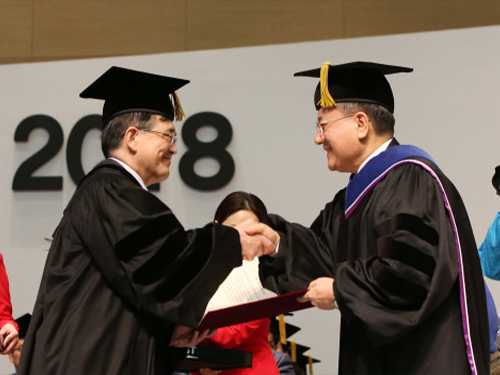 Samsung Electronics' Chairman Kwon Becomes the First Alumnus Honorary Doctorate
(Samsung Electronics' Chairman & CEO Kwon,left, and President Shin)
The semiconductor has bred innovation in Korea, as one of the staples of economic growth. Without the success of the semiconductor industry of Korea, it is hard to imagine the high tech dominance in the global market enjoyed by Korean companies.
It is said that one in every four Ph.D.s working in the semiconductor industry of Korea graduated from KAIST. Among them, Chairman and CEO Oh-Hyun Kwon of Samsung Electronics, Class of 1977, has arrived at the epitome of this top industry.
KAIST’s class of 1977 produced many movers and shakers in Korea’s innovation efforts. Now in their mid-60s, they were the players who embodied Korea’s ICT and helped it become a global powerhouse. They are the ones who worked for and witnessed the socio-economic transformation of Korea through innovation.
In recognition of his unsurpassable entrepreneurship, which made the remarkable strides in the semiconductor and electronics industry in Korea and beyond, Chairman Kwon was honored as the first recipient of an honorary doctorate from his alma mater on February 23 during the 2018 commencement ceremony.
After completing his Master's in Electrical Engineering at KAIST in 1977, he earned his Ph.D. in Electrical Engineering from Stanford University. The first honorary degree bestowed to an alumnus was conferred by the first alumnus President of KAIST Sung-Chul Shin. President Shin said that Chairman Kwon’s exceptional leadership has inspired the KAIST community and exemplified the spirit of KAIST.
Currently serving as chairman & CEO of Samsung Electronics and Samsung Advanced Institute of Technology (SAIT), Kwon has worked for Samsung in a variety of key positions in their semiconductor division since 1985.
In the mid-1980s, Japan was leading the global semiconductor market. At Samsung, Chairman Kwon, who was in charge of the memory semiconductor team, successfully developed 4M DRAM. Later in 1992, he played a leading role in the development of the world’s first 64M DRAM.
The success of 4M DRAM and 64M DRAM led Samsung to clinch the top position in the DRAM and NAND flash business around the world. This helped Samsung emerge as a global leader in the semiconductor industry.
As a result, Samsung, as well as the national economy, could gain significant momentum to build national competitiveness and economic growth. The outstanding technological leadership of Chairman Kwon led to the development of proprietary semiconductor design and processes technologies as well as numerous patents.
He also played a leadership role in creating a mutual growth environment among conglomerates rather than merely engaging in direct competition. Chairman Kwon made every effort to establish the cornerstone of mutual growth, especially in relationships with small and medium-sized enterprises (SMEs). His win-win collaboration initiatives among conglomerates and SMEs made a significant impact on the development of the entire industry of Korea.
In his acceptance speech, he charged the graduates to embrace challenges, to collaborate with peers, and create their own future.
The full text of his speech is printed below.
Graduates and distinguished guests! I extend my sincere congratulations to my fellow graduates, as you are awarded degrees for your deep efforts, as well as to the parents and family members who have supported you.
In 1977, I received my Master’s degree in Electrical Engineering from KAIST. Today, as the first honorary doctor among KAIST graduates, I am truly honored to be here. I am deeply grateful to all of you, including President Sung-Chul Shin and the Chairman of the Board of Trustees, Jang-Moo Lee.
Today, I want to tell you about the experiences and lessons I have learned from my 40 years of corporate management experience.
First, you should lead and drive changes by yourself. In the process of realizing a dream, the situation and circumstances do not always proceed as you planned.
I started my career as a researcher. However, I had to continuously transform myself into a project leader, business team leader, and CEO. It was challenging every time, due to a lack of preparing and my insufficient ability. However, I have always accomplished the intended goal through the mindset of embracing changes and studying new things.
It is said that the survivors are not always the strongest nor the most intelligent, but the ones who are the most adaptive to changes. We can only be the last survivor if we have the character to see those small signs that signal changes are coming and cope with changes well. Take changes positively and actively and then, transform yourself to match a given situation.
In addition, it is important to understand others. When it comes to one’s career, there is nothing that you can do alone without the assistance of others. If it is not possible to do everything by yourself, you will need to supplement your efforts through the help of others. To do this, you need to understand your colleagues, bosses, and customers first.
People, who work in tech tend to cage themselves in their own silos. But in an era of destructive innovation, where boundaries of industries and technologies are collapsing at a breakneck pace, scientists also need to enhance their understanding of various areas such as culture, art, and the humanities.
This is a famous verse from a poem by Chun-Soo Kim.
Before I called his name,
He was nothing but a gesture.
When I called his name, He came to me and became a flower.
Make wonderful synergy by making your partner a flower and complementing each other. When you first notice the true value of another person and interact with them, the value of the individual will be doubled and will bring about a greater impact.
Finally, we all need to cooperate with each other. All of you here, including myself, are people who have benefited from society. We must cooperate with each other and give back to society for the best results.
A biologist once said that incremental evolution comes from competition, but fundamental evolution comes from cooperation. Great leaders should achieve results through cooperation rather than competition.
You are the future leaders with top-class knowledge. I hope you will become great leaders who have wisdom that combines external resources with your abilities.
Now, graduates of 2018 who are standing at the starting line, we often worry about an unpredictable tomorrow. However, the smartest way to predict the future is to create the future for ourselves. Moreover, we can try again even though we sometimes make mistakes. I urge you to make future you are hoping for.
Once again, I would like to thank you for this honorary doctorate and extend my sincere wishes for the endless development of KAIST and the best of luck to the futures of these graduates. Thank you.
2018.02.26 View 9256
Samsung Electronics' Chairman Kwon Becomes the First Alumnus Honorary Doctorate
(Samsung Electronics' Chairman & CEO Kwon,left, and President Shin)
The semiconductor has bred innovation in Korea, as one of the staples of economic growth. Without the success of the semiconductor industry of Korea, it is hard to imagine the high tech dominance in the global market enjoyed by Korean companies.
It is said that one in every four Ph.D.s working in the semiconductor industry of Korea graduated from KAIST. Among them, Chairman and CEO Oh-Hyun Kwon of Samsung Electronics, Class of 1977, has arrived at the epitome of this top industry.
KAIST’s class of 1977 produced many movers and shakers in Korea’s innovation efforts. Now in their mid-60s, they were the players who embodied Korea’s ICT and helped it become a global powerhouse. They are the ones who worked for and witnessed the socio-economic transformation of Korea through innovation.
In recognition of his unsurpassable entrepreneurship, which made the remarkable strides in the semiconductor and electronics industry in Korea and beyond, Chairman Kwon was honored as the first recipient of an honorary doctorate from his alma mater on February 23 during the 2018 commencement ceremony.
After completing his Master's in Electrical Engineering at KAIST in 1977, he earned his Ph.D. in Electrical Engineering from Stanford University. The first honorary degree bestowed to an alumnus was conferred by the first alumnus President of KAIST Sung-Chul Shin. President Shin said that Chairman Kwon’s exceptional leadership has inspired the KAIST community and exemplified the spirit of KAIST.
Currently serving as chairman & CEO of Samsung Electronics and Samsung Advanced Institute of Technology (SAIT), Kwon has worked for Samsung in a variety of key positions in their semiconductor division since 1985.
In the mid-1980s, Japan was leading the global semiconductor market. At Samsung, Chairman Kwon, who was in charge of the memory semiconductor team, successfully developed 4M DRAM. Later in 1992, he played a leading role in the development of the world’s first 64M DRAM.
The success of 4M DRAM and 64M DRAM led Samsung to clinch the top position in the DRAM and NAND flash business around the world. This helped Samsung emerge as a global leader in the semiconductor industry.
As a result, Samsung, as well as the national economy, could gain significant momentum to build national competitiveness and economic growth. The outstanding technological leadership of Chairman Kwon led to the development of proprietary semiconductor design and processes technologies as well as numerous patents.
He also played a leadership role in creating a mutual growth environment among conglomerates rather than merely engaging in direct competition. Chairman Kwon made every effort to establish the cornerstone of mutual growth, especially in relationships with small and medium-sized enterprises (SMEs). His win-win collaboration initiatives among conglomerates and SMEs made a significant impact on the development of the entire industry of Korea.
In his acceptance speech, he charged the graduates to embrace challenges, to collaborate with peers, and create their own future.
The full text of his speech is printed below.
Graduates and distinguished guests! I extend my sincere congratulations to my fellow graduates, as you are awarded degrees for your deep efforts, as well as to the parents and family members who have supported you.
In 1977, I received my Master’s degree in Electrical Engineering from KAIST. Today, as the first honorary doctor among KAIST graduates, I am truly honored to be here. I am deeply grateful to all of you, including President Sung-Chul Shin and the Chairman of the Board of Trustees, Jang-Moo Lee.
Today, I want to tell you about the experiences and lessons I have learned from my 40 years of corporate management experience.
First, you should lead and drive changes by yourself. In the process of realizing a dream, the situation and circumstances do not always proceed as you planned.
I started my career as a researcher. However, I had to continuously transform myself into a project leader, business team leader, and CEO. It was challenging every time, due to a lack of preparing and my insufficient ability. However, I have always accomplished the intended goal through the mindset of embracing changes and studying new things.
It is said that the survivors are not always the strongest nor the most intelligent, but the ones who are the most adaptive to changes. We can only be the last survivor if we have the character to see those small signs that signal changes are coming and cope with changes well. Take changes positively and actively and then, transform yourself to match a given situation.
In addition, it is important to understand others. When it comes to one’s career, there is nothing that you can do alone without the assistance of others. If it is not possible to do everything by yourself, you will need to supplement your efforts through the help of others. To do this, you need to understand your colleagues, bosses, and customers first.
People, who work in tech tend to cage themselves in their own silos. But in an era of destructive innovation, where boundaries of industries and technologies are collapsing at a breakneck pace, scientists also need to enhance their understanding of various areas such as culture, art, and the humanities.
This is a famous verse from a poem by Chun-Soo Kim.
Before I called his name,
He was nothing but a gesture.
When I called his name, He came to me and became a flower.
Make wonderful synergy by making your partner a flower and complementing each other. When you first notice the true value of another person and interact with them, the value of the individual will be doubled and will bring about a greater impact.
Finally, we all need to cooperate with each other. All of you here, including myself, are people who have benefited from society. We must cooperate with each other and give back to society for the best results.
A biologist once said that incremental evolution comes from competition, but fundamental evolution comes from cooperation. Great leaders should achieve results through cooperation rather than competition.
You are the future leaders with top-class knowledge. I hope you will become great leaders who have wisdom that combines external resources with your abilities.
Now, graduates of 2018 who are standing at the starting line, we often worry about an unpredictable tomorrow. However, the smartest way to predict the future is to create the future for ourselves. Moreover, we can try again even though we sometimes make mistakes. I urge you to make future you are hoping for.
Once again, I would like to thank you for this honorary doctorate and extend my sincere wishes for the endless development of KAIST and the best of luck to the futures of these graduates. Thank you.
2018.02.26 View 9256 -
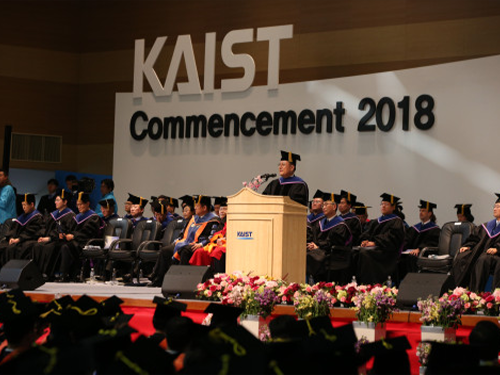 The 2018 Commencement of KAIST at a Glance
KAIST awarded a total of 2, 736 degrees at the 2018 commencement ceremony on February 23. Among the honorees, Chairman and CEO of Samsung Electronics and Samsung Advanced Institute of Technology (SAIT) Oh-Hyun Kwon was recognized as the first alumnus honorary doctorate recipient of KAIST.
More than 5,000 family, friends, and graduates including distinguished guests of Minister of Science and ICT Young-Min Yu, the Member of National Assembly Kyung-Jin Kim, Chairman of the KAIST Board of Trustees Jang-Moo Lee, and the Chairperson of the KAIST Development Foundation Soo-Young Lee attended to celebrate the graduates. During the commencement, a total of 2,736 students earned degrees: 644 PhD degrees, 1,352 master’s degrees, and 740 bachelor’s degrees.
(Minister of Science and ICT Young-Min Yu)
(The Member of National Assembly Kyung-Jin Kim)
This year, Chairman and CEO of Samsung Electronics and SAIT Kwon shared the spotlight with many other graduates. Kwon received his Master’s degree in Electrical Engineering from KAIST in 1977 and completed his Ph.D. in Electrical Engineering from Stanford University in 1985. During his more than 33-year career at Samsung, he has made significant contribution to the development of 4M DRAM and the world’s first 64M DRAM. The success of 4M DRAM and 64 DRAM led Samsung to clinch the top position in the DRAM and NAND flash business around the world. This helped Samsung emerge as a global leader in the semiconductor industry.
(From left: Chairman and CEO of Samsung Electronics and SAIT Oh-Hyun Kwon and KAIST President Sung-Chul Shin)
During the commencement speech, Kwon and President Shin both highlighted the importance of collaboration instead of competition.
Kwon encouraged the graduates to understand others to make wonderful synergy. “When you first notice the true value of another person and interact with them, the value of the individual will be doubled and will bring about a greater impact,” he said.
Also, he stressed having a collaborative mindset by saying, “All of you here, including myself, are people who have benefited from society. We must cooperate with each other and give back to society for the vest results.”
While highlighting the core values of KAIST, creativity, challenge and caring, President Shin also emphasized collaboration with others. He said, “In the future, expertise in a single discipline will not lead to new inventions or discoveries. This highlights the importance of multidisciplinary, convergence research. The key to success lies in the acknowledgement of your peers as partners for mutual growth. Your partners will make up your weak areas and become your most important asset. May you expand your personal network by finding valuable partners not only within your laboratory and workplace, but beyond Korea.”
“Go out into the world and change it as a global shaper, global innovator, and global mover. I hope that each and every one of you will add benefits the world and your legacy will be remembered for generations to come. This is your obligation as a graduate of KAIST,” he said.
Click here to view the full text of President Sung-Chul Shin’s address to the graduates
+ List of academically outstanding undergraduate degree recipients who received honors during the Commencement 2018 of KAIST
Award
Department
Winner
Minister of Science and ICT Award
Dept. of Mathematical Sciences
Seong-Hyeok Park
KAIST Board Chairperson Award
School of Computing
Hyeong-Seok Kim
KAIST President Award
Dept. of Chemistry
Hoi-Min Cheong
KAIST Development Foundation Chairperson Award
Dept. of Biological Sciences
Gi-Song Kim
Dept. of Industrial & Systems Engineering
Seung-Hun Lee
2018.02.23 View 13519
The 2018 Commencement of KAIST at a Glance
KAIST awarded a total of 2, 736 degrees at the 2018 commencement ceremony on February 23. Among the honorees, Chairman and CEO of Samsung Electronics and Samsung Advanced Institute of Technology (SAIT) Oh-Hyun Kwon was recognized as the first alumnus honorary doctorate recipient of KAIST.
More than 5,000 family, friends, and graduates including distinguished guests of Minister of Science and ICT Young-Min Yu, the Member of National Assembly Kyung-Jin Kim, Chairman of the KAIST Board of Trustees Jang-Moo Lee, and the Chairperson of the KAIST Development Foundation Soo-Young Lee attended to celebrate the graduates. During the commencement, a total of 2,736 students earned degrees: 644 PhD degrees, 1,352 master’s degrees, and 740 bachelor’s degrees.
(Minister of Science and ICT Young-Min Yu)
(The Member of National Assembly Kyung-Jin Kim)
This year, Chairman and CEO of Samsung Electronics and SAIT Kwon shared the spotlight with many other graduates. Kwon received his Master’s degree in Electrical Engineering from KAIST in 1977 and completed his Ph.D. in Electrical Engineering from Stanford University in 1985. During his more than 33-year career at Samsung, he has made significant contribution to the development of 4M DRAM and the world’s first 64M DRAM. The success of 4M DRAM and 64 DRAM led Samsung to clinch the top position in the DRAM and NAND flash business around the world. This helped Samsung emerge as a global leader in the semiconductor industry.
(From left: Chairman and CEO of Samsung Electronics and SAIT Oh-Hyun Kwon and KAIST President Sung-Chul Shin)
During the commencement speech, Kwon and President Shin both highlighted the importance of collaboration instead of competition.
Kwon encouraged the graduates to understand others to make wonderful synergy. “When you first notice the true value of another person and interact with them, the value of the individual will be doubled and will bring about a greater impact,” he said.
Also, he stressed having a collaborative mindset by saying, “All of you here, including myself, are people who have benefited from society. We must cooperate with each other and give back to society for the vest results.”
While highlighting the core values of KAIST, creativity, challenge and caring, President Shin also emphasized collaboration with others. He said, “In the future, expertise in a single discipline will not lead to new inventions or discoveries. This highlights the importance of multidisciplinary, convergence research. The key to success lies in the acknowledgement of your peers as partners for mutual growth. Your partners will make up your weak areas and become your most important asset. May you expand your personal network by finding valuable partners not only within your laboratory and workplace, but beyond Korea.”
“Go out into the world and change it as a global shaper, global innovator, and global mover. I hope that each and every one of you will add benefits the world and your legacy will be remembered for generations to come. This is your obligation as a graduate of KAIST,” he said.
Click here to view the full text of President Sung-Chul Shin’s address to the graduates
+ List of academically outstanding undergraduate degree recipients who received honors during the Commencement 2018 of KAIST
Award
Department
Winner
Minister of Science and ICT Award
Dept. of Mathematical Sciences
Seong-Hyeok Park
KAIST Board Chairperson Award
School of Computing
Hyeong-Seok Kim
KAIST President Award
Dept. of Chemistry
Hoi-Min Cheong
KAIST Development Foundation Chairperson Award
Dept. of Biological Sciences
Gi-Song Kim
Dept. of Industrial & Systems Engineering
Seung-Hun Lee
2018.02.23 View 13519